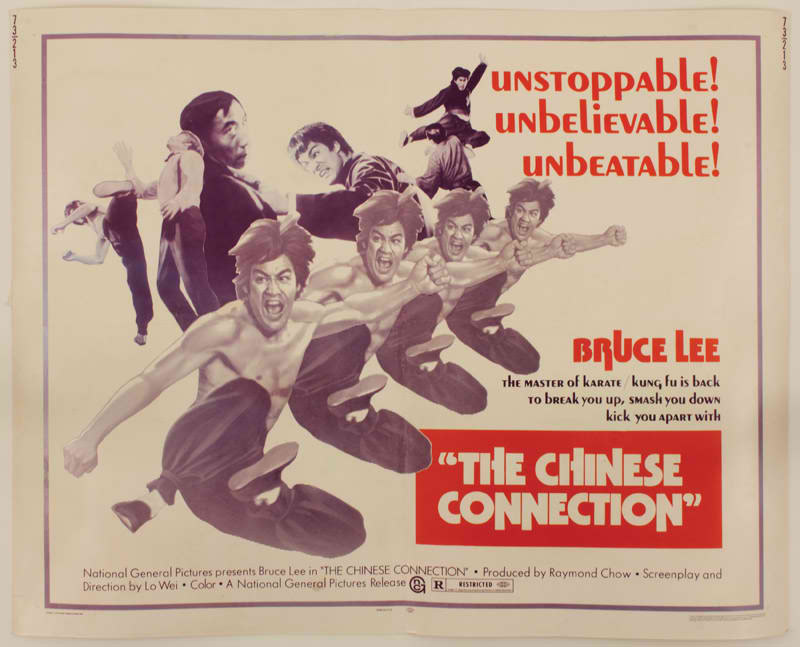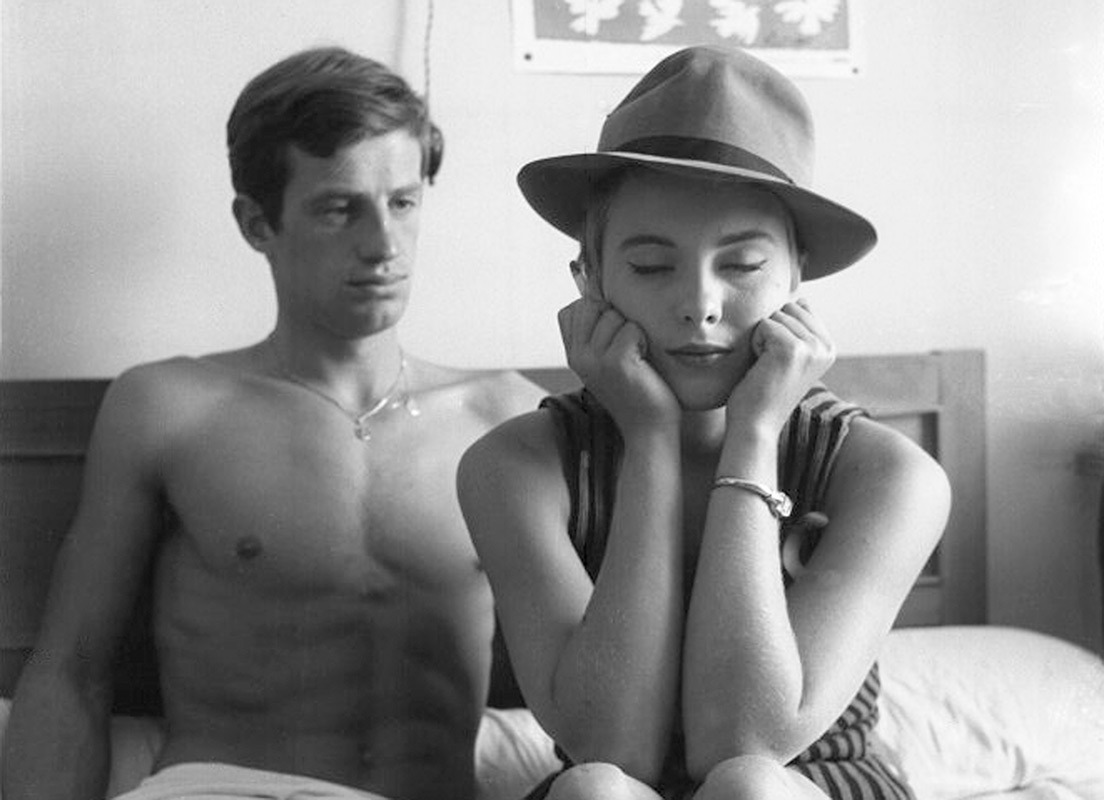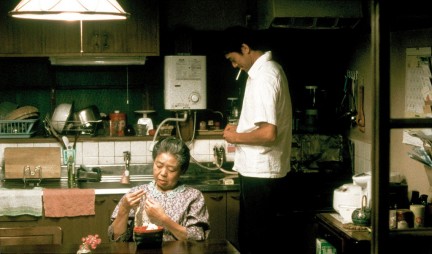Today l reach the dirty thirty. That feels pretty messed up. I mean, I'm almost dead.
Things have gestated for the last ten years or so, with me having no sense of what I'm "supposed" to do. But, now I'm programming at the Trylon Microcinema with a wonderful group of people and I'm running a movie blog with one of my best friends. That seems to me like exactly what I want to do.
I feel that I've been very shaped by movies. Anyway, after watching about a movie a day for the last decade, here are the films that count as major landmarks on my way.
Things have gestated for the last ten years or so, with me having no sense of what I'm "supposed" to do. But, now I'm programming at the Trylon Microcinema with a wonderful group of people and I'm running a movie blog with one of my best friends. That seems to me like exactly what I want to do.
I feel that I've been very shaped by movies. Anyway, after watching about a movie a day for the last decade, here are the films that count as major landmarks on my way.
THE CHINESE CONNECTION (1972), Directed by Wei Lo
When I moved from Sioux Falls, South Dakota to a smaller town, Owatonna, Minnesota, movies became my solace. I watched tons of them on my own. Nothing that really stands out as true love anymore, just a steady diet of decent films: Jurassic Park, Patton, Terminator 2: Judgement Day etc... (Typical juvenile male fare)
In 10th grade political science, I started to talk about kung-fu movies with Matt (M. McSlam). I invited him over to watch movies and he brought over the Bruce Lee film, THE CHINESE CONNECTION. I was in awe. Not just of Lee's charisma and skill, but by the experience of enjoying a film so fully while connecting with friends. We spent a lot of time together after that, enjoying all kinds of things, but finally coming back to film. And, here we are.
RAMBO: FIRST BLOOD PART II (1985) Directed by George P. Cosmatos
I first saw Rambo on TNT in high school. After that, I watched it numerous times with friends, just to enjoy the pure ludicrous nature of it. I mean, he shoots an exploding arrow at this dude, and the dude explodes...
In college, I was studying American history with an emphasis on the Vietnam War. This transformed to Vietnam War films made in the 1980s, with particular attention on Rambo. Put in context, not only was this an extremely entertaining, and bumbling, film, it was also a signpost of 1980s politics. I ended up writing my senior paper on the prominent role of Rambo and other right-wing Vietnam War films in illustrating the return of victory culture to the US. The straight-forward nature of the politics in the film allowed room for me to be new at film critique and still offer some new ideas. It also gave me an opportunity to realize that film criticism, no matter how serious or "good" the film, is a worthwhile endeavor that I truly love doing.
BREATHLESS (A Bout de Souffle), 1960, Directed by Jean-Luc Godard
 |
| Connection |
In 10th grade political science, I started to talk about kung-fu movies with Matt (M. McSlam). I invited him over to watch movies and he brought over the Bruce Lee film, THE CHINESE CONNECTION. I was in awe. Not just of Lee's charisma and skill, but by the experience of enjoying a film so fully while connecting with friends. We spent a lot of time together after that, enjoying all kinds of things, but finally coming back to film. And, here we are.
RAMBO: FIRST BLOOD PART II (1985) Directed by George P. Cosmatos
 |
| Victory Culture = racism + exploding arrows |
In college, I was studying American history with an emphasis on the Vietnam War. This transformed to Vietnam War films made in the 1980s, with particular attention on Rambo. Put in context, not only was this an extremely entertaining, and bumbling, film, it was also a signpost of 1980s politics. I ended up writing my senior paper on the prominent role of Rambo and other right-wing Vietnam War films in illustrating the return of victory culture to the US. The straight-forward nature of the politics in the film allowed room for me to be new at film critique and still offer some new ideas. It also gave me an opportunity to realize that film criticism, no matter how serious or "good" the film, is a worthwhile endeavor that I truly love doing.
BREATHLESS (A Bout de Souffle), 1960, Directed by Jean-Luc Godard
 |
| New to the game |
Though Godard no longer has the same appeal to me that he once had, I still owe Breathless a great deal of gratitude. It led me down a rabbit hole, causing me to seek out Truffaut, Antonioni, Resnais and finally Kurosawa. I saw this movie first in my Freshmen French Class in College. It was my first "art" film experience. I was so impressed with the editing and dreamy plotting that I did my best to hunt down as many films like it as I could. It was pastiche while being current. It was a blend of homage to American pulp films and a satire of neo-realist European cinema. It also was a huge mystery to me. I felt I needed to understand it.
DAWN OF THE DEAD (1978) Directed by George A. Romero
I had a constant curiosity about horror films growing up, but I didn't see all that many. I first saw The Exorcist at a friends party in 9th grade and was absolutely terrified. I had vague recollections of Dracula and Poltergeist, but I don't truly remember seeing them until later. Most likely I just saw trailers. Then came Night of the Living Dead in 11th grade, maybe? The idea that a horror film could be about the civil rights movement changed the way that I viewed horror and exploitation cinema. It had never dawned on me that something like Nightmare on Elm Street could really be about white flight to the suburbs, or that I could even make my own decisions on what a film is about.
DAWN OF THE DEAD (1978) Directed by George A. Romero
 |
| Social Commentary? |
Matt introduced me to Dawn of the Dead the year after high school. We were playing in a band and watching movies pretty much all the time we weren't practicing. It was a revelation. It was a commentary on consumerism. It was about the possibility of a future without rules. And, it changed the way I looked for political subtext.
STILL WALKING (2008) Directed by Hirokazu Koreeda
 |
| Quiet Moments |
This film also led me to seek out Yasujiro Ozu, as Koreeda is his successor. Ozu is a true master, and his films have enriched my life in such a way as only a few films can. Again, each time I see one of his films I hope to look at people with more compassion and complexity. Likewise, this led me to some of my other favorite filmmakers: John Cassavetes, Wong Kar-Wai, Takeshi Kitano and Kiyoshi Kurosawa.
SLEDGEHAMMER (1983) Directed by David A. Prior
![snapshot_dvd_01.19.26_[2011.10.16_20.57.41]_0.jpg (685×455)](http://www.vhscollector.com/sites/default/files/article_images/snapshot_dvd_01.19.26_%5B2011.10.16_20.57.41%5D_0.jpg) |
| "Killer" |
And, it's also causing me to evaluate what it is that we're doing with this little site. The "it's so bad it's good" love of movies is a complicated relationship. Sure, there is the irony of loving something you know is a disaster. And, yes Sledgehammer is "bad." However, "bad" isn't multi-dimensional enough to describe why one would love a movie like this. There isn't any reason to like something because it sucks. If it just sucked, it wouldn't give you any joy. (ie: Transformers 2 sucks and gives me no joy, whatsoever)
My brother Ross and I had a conversation this weekend about the ability to enjoy something "bad" and also brilliant art films. I was informed that some random French sociologist believes it's about a demarcation between classes. It's a middle ground that sub-consciously places me above the unwashed masses of bros (as I see them as unable to self-analyze) and below the arty snobs that refuse to have fun. I agree with this in a way (as my place in my class does define much of how I see the world), but I believe it's also about the leveling of film. One of the things I've always loved about cinema is that it's a people's art. It is cheap to see, and everyone gets to see the original.
For the most part, film is a very approachable art. Something like Au Hasard Balthazar may be about the world's sins and the sense of cruelty that pervades all existence. But, it's also a movie about a donkey, and even without any desire for deeper meanings it can be enjoyed at that level as well.
So, back to Sledgehammer. There is something about Prior's work that is refreshing in it's absolute abandon of self-reflection. Without any studio involvement or control, Prior made a very strange film that sits somewhere between David Lynchian stream of consciousness and Michael Bay-like mindless self indulgence. And, beyond that, it's incredibly enjoyable and a little scary, in that you have no idea where it's going to go.
At the same time, if something makes you think about yourself or your culture, does it matter the artist's intention or competency? If it gives you some enjoyment, can it be considered trash? In that, there isn't a whole lot of distance between It's Alive and Late Spring.
And, just because, here are my current 10 favorite films in no particular order: (until tomorrow or the next day when I see something new, when this list probably changes)
1. In the Mood for Love (2000)
2. There will be Blood (2007)
3. Phantasm (1979)
4. Faces (1968)
5. The Thin Red Line (1998)
6. The Beyond (1981)
7. Barton Fink (1991)
8. Lawrence of Arabia (1962)
9. Tokyo Story (1953)
10. The Thing (1982)
My brother Ross and I had a conversation this weekend about the ability to enjoy something "bad" and also brilliant art films. I was informed that some random French sociologist believes it's about a demarcation between classes. It's a middle ground that sub-consciously places me above the unwashed masses of bros (as I see them as unable to self-analyze) and below the arty snobs that refuse to have fun. I agree with this in a way (as my place in my class does define much of how I see the world), but I believe it's also about the leveling of film. One of the things I've always loved about cinema is that it's a people's art. It is cheap to see, and everyone gets to see the original.
For the most part, film is a very approachable art. Something like Au Hasard Balthazar may be about the world's sins and the sense of cruelty that pervades all existence. But, it's also a movie about a donkey, and even without any desire for deeper meanings it can be enjoyed at that level as well.
So, back to Sledgehammer. There is something about Prior's work that is refreshing in it's absolute abandon of self-reflection. Without any studio involvement or control, Prior made a very strange film that sits somewhere between David Lynchian stream of consciousness and Michael Bay-like mindless self indulgence. And, beyond that, it's incredibly enjoyable and a little scary, in that you have no idea where it's going to go.
At the same time, if something makes you think about yourself or your culture, does it matter the artist's intention or competency? If it gives you some enjoyment, can it be considered trash? In that, there isn't a whole lot of distance between It's Alive and Late Spring.
And, just because, here are my current 10 favorite films in no particular order: (until tomorrow or the next day when I see something new, when this list probably changes)
1. In the Mood for Love (2000)
2. There will be Blood (2007)
3. Phantasm (1979)
4. Faces (1968)
5. The Thin Red Line (1998)
6. The Beyond (1981)
7. Barton Fink (1991)
8. Lawrence of Arabia (1962)
9. Tokyo Story (1953)
10. The Thing (1982)
And, that's where I head off for the next thirty years.
-J. Moret

No comments:
Post a Comment